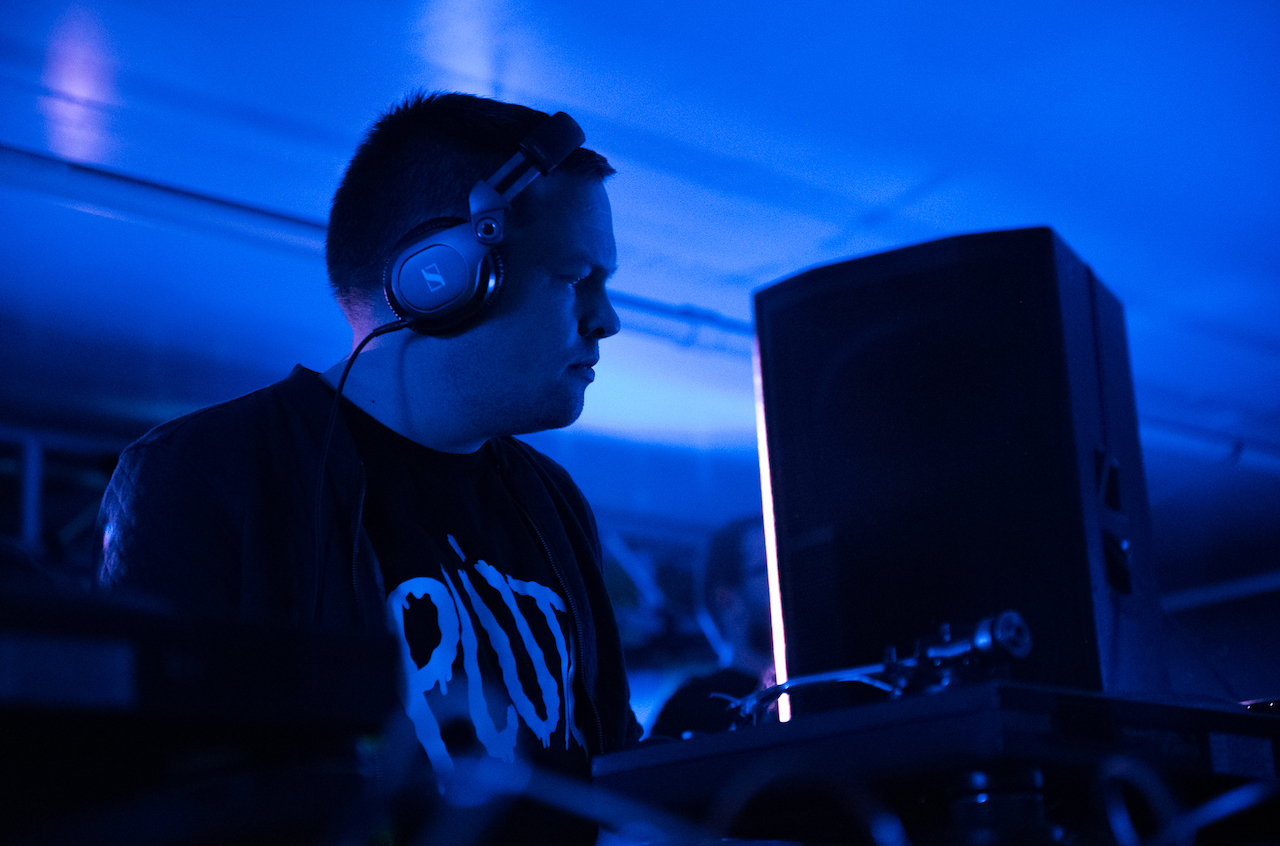- Any conversation of a certain length between a visitor to Iceland and a native will sooner or later turn to tourism. Iceland, and in particular the capital Reykjavik, is currently one of the fastest-growing holiday destinations in the world. More than 1.7 million people made the trip in 2016—a 40% increase from the year before—and for the first time in the country's history, tourism has replaced fishing as the main source of income. This has its pros and cons. Most Icelanders are welcoming and hospitable people who are happy to see their island doing so well, but they're also proud and protective of their culture and customs. They don't want tourism to dilute or damage their country's singular charm.
For this reason, Sónar Reykjavik, the longest-running of the Barcelona festival's franchises, has always pushed a strong contingent of local artists. 2017 was no different. There was soppy electronica (GusGus) and instrumental trap (sxsxsx), blistering techno (Exos) and pumping tech house (Áskell). Rap and hip-hop, which are particularly big in Iceland, were well represented by the likes of Sturla Atlas, GKR and 17-year-old sensation Aron Can. The international bookings, though equally broad in genre, felt less daring, with a few too many legacy acts (Fatboy Slim, De La Soul) and festival standards (Moderat).
All of this went down across three days and four stages at Harpa Concert Hall, an architectural marvel on Reykjavik's waterfront. Doors were from 8 PM through 3 AM each night, which meant that the days were for hitting heated outdoor pools, wandering around the city's many trendy shops and cafes, or venturing further afield to explore Iceland's striking natural wonders and extraterrestrial landscapes. The overall experience was nothing but smooth from start to finish, with none of the usual bouts of fatigue that can plague so many festivals. In short, I had an exceptionally good time.
Here are five key performances from Sónar Reykjavik 2017.
Helena Hauff
Five minutes before Helena Hauff started her set at SonarLab, a stark, gritty stage in Harpa's underground car park, a small crowd stood idly about while rampant drum & bass hurtled from the Funktion-Ones. Hauff, keen to keep the music tough and energetic, opened with a speedy electro break that seemed to breathe new life into the long, grey space. The crowd, as it was across the festival, was young and fashion-forward: to my right, a boy in a Mad Decent snapback fiddled with the cord of his lit up mask, while to my left, a girl bearing a striking resemblance to Eleven in Stranger Things adjusted her neckerchief.
By the time Hauff was four or five cuts deep, the floor had quadrupled in size and it was going off. She slipped from Detroit electro (Aquanauts' "Bang") into a middle passage of 4/4 techno, going between harder industrial bits (Domenico Crisci's "Return) and smoother acid (Unit Moebius's "Penetrator"). Her tracks were frenetic and full of sass, with plenty of call and response between the various tweaks, bleeps and squiggles. It's easy music to lose yourself in—strange enough to feel otherworldly, but with enough funk and groove to keep you moving. She circled back to Detroit to close, throwing down F.U.S.E.'s "F.U." and a couple of others before setting down her headphones and taking a long glug of beer.
Blawan back-to-back Exos
In his review of Sónar Reykjavik's debut edition in 2013, Matt Unicomb said that "Iceland is someway short of becoming a breeding ground for house and techno." Four years later, club beats are among the nation's biggest musical exports, thanks to the rise of artists like Bjarki and Exos. The latter played back-to-back with Blawan in the car park on Friday night, following Helena Hauff with two hours of functional, punishing, 135 BPM techno. Diehard locals, from lads on their own to groups of girls, elbowed their way to the front. Both DJs mixed quickly, to the extent that they only left the decks to flick through their record bags. As such, it was hard to tell who was playing what—I think it was Blawan who unleashed a volley of rave stabs around 2 AM, but I can't be sure.
The music was, for my tastes, too linear, though there's always something fascinating about watching DJs sculpt a performance without so much as looking at each other. As the 3 AM cut-off came and went, Blawan (I think) cut in Indo Tribe's hardcore anthem "Owl." Exos, desperate for a chance to respond, looked devastated when the lights went up. He picked up the record from the deck and waved it at the promoter, as if to say "look what I was going to play!"
BEA1991
At about 10:25 PM on Saturday, BEA1991 shot the silent, seated crowd at SónarComplex a nervous look. A few people had decided to brave the awkwardness and leave, and it had started a domino effect. Moments later, the previously packed auditorium had emptied by roughly a third. Presumably they'd left because the show had been slow to get going—the Amsterdam-born artist, dressed in an orange jumpsuit, had opened with a series of spoken-word recordings (including this speech from Derek Jarman's 1993 film, Wittgenstein) layered with birdsong and sex sounds. The atmosphere was calm, but I remember wriggling in my seat.
BEA1991 sprang to life in the second half, swivelling on her heels and focussing her attention on a sampler, keyboard and mic. She punched out warm, dreamy trip hop beats and played buttery chords over the top. Her voice was beautiful—piercing yet tender—and you could sense the audience warming to her with every note. "I was really nervous before tonight, it's a little like wanting eight arms but not having them," she said, smiling. It turns out this was her first ever solo gig; previously, she'd had a band. This explained the mistakes and the rough-around-the-edges feel, though, for me, this was what was so captivating. Her performance had soul and sparkle. It was just reward for sticking around.
Giggs
Giggs headlined the cube-shaped SónarHall on Saturday, playing after 17-year-old Icelandic rapper Aron Can. A sizeable throng had gathered for the teenager, who spat over melodic trap beats while virtual wads of Icelandic Krona rained down onscreen. After a quick drink, I returned to find the room considerably sparser for Giggs—a surprise, but proof that Fatboy Slim, who was playing next door, still lures the crowds. The Peckham artist, real name Nathaniel Thomson, didn't seem fazed, bounding onstage in a blue baseball jacket and shiny gold "giggs" chain. He rattled through tunes from last year's Landlord LP, an album that favours low-slung trap and hip-hop beats to the frenetic grime of his contemporaries. The energy ramped up quickly, spurred on by Thomson's cheeky, personable patter ("We gotta go mental in here. Do something, kick something"). By the time JME's "Man Don't Care" came around, the atmosphere was looser and more jubilant than it had been all weekend. For "Whippin Excursion," the set's finale, a full mosh pit formed two feet in front of me. "Iceland you're sick!" hollered Thompson, as trendy 20-somethings crashed into one another, their beers flailing.
Plútó
Plútó are a seven-strong DJ collective with more than 20 years of experience DJing, running parties and hosting radio shows in Iceland. Their grounding is in bass music, from dubstep, breaks and drum & bass to newer styles like footwork, juke and grime. I was always going to check them out—they were down for the final slot of the festival in the car park—but had I never heard of them, my interest would have likely been piqued by the number of old, smiling men I saw in black "Plútó" T-shirts wandering around Harpa. Downstairs, these men, and roughly ten others, were gathered in the booth, drinking beers and cracking jokes. The DJs took turns playing one tune each, pushing past one another with their records held aloft. The music was all over the place in the best possible sense. Ravey techno collapsed into weightless grime and UK bass bangers (Pinch and Riko Dan's "Screamer") morphed into South African gqom (DJ Lag's "Ghost On The Loose"). The mixing was ocassionally sloppy, though the incoming track was usually so fun that no one batted an eyelid. The end of Sónar Reykjavik was fast approaching, and people just wanted to dance.
Photo credit /
Lilja Draumland - Lead
Berglaug Petra - Helena Hauff, Blawan back-to-back Exos, Plútó
Ásgeir Helgi - BEA1991, Giggs
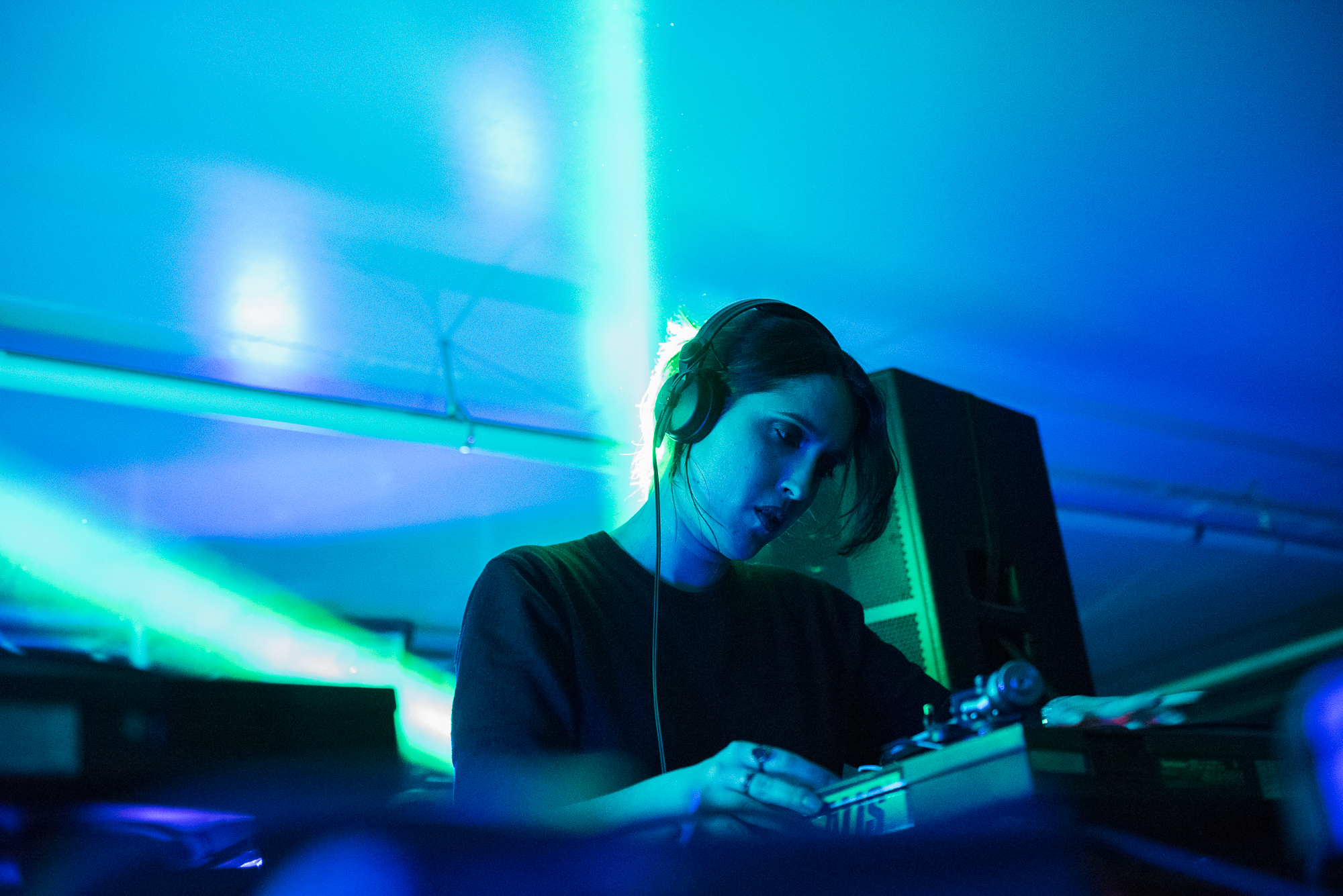 Blawan back-to-back Exos In his review of Sónar Reykjavik's debut edition in 2013, Matt Unicomb said that "Iceland is someway short of becoming a breeding ground for house and techno." Four years later, club beats are among the nation's biggest musical exports, thanks to the rise of artists like Bjarki and Exos. The latter played back-to-back with Blawan in the car park on Friday night, following Helena Hauff with two hours of functional, punishing, 135 BPM techno. Diehard locals, from lads on their own to groups of girls, elbowed their way to the front. Both DJs mixed quickly, to the extent that they only left the decks to flick through their record bags. As such, it was hard to tell who was playing what—I think it was Blawan who unleashed a volley of rave stabs around 2 AM, but I can't be sure. The music was, for my tastes, too linear, though there's always something fascinating about watching DJs sculpt a performance without so much as looking at each other. As the 3 AM cut-off came and went, Blawan (I think) cut in Indo Tribe's hardcore anthem "Owl." Exos, desperate for a chance to respond, looked devastated when the lights went up. He picked up the record from the deck and waved it at the promoter, as if to say "look what I was going to play!"
Blawan back-to-back Exos In his review of Sónar Reykjavik's debut edition in 2013, Matt Unicomb said that "Iceland is someway short of becoming a breeding ground for house and techno." Four years later, club beats are among the nation's biggest musical exports, thanks to the rise of artists like Bjarki and Exos. The latter played back-to-back with Blawan in the car park on Friday night, following Helena Hauff with two hours of functional, punishing, 135 BPM techno. Diehard locals, from lads on their own to groups of girls, elbowed their way to the front. Both DJs mixed quickly, to the extent that they only left the decks to flick through their record bags. As such, it was hard to tell who was playing what—I think it was Blawan who unleashed a volley of rave stabs around 2 AM, but I can't be sure. The music was, for my tastes, too linear, though there's always something fascinating about watching DJs sculpt a performance without so much as looking at each other. As the 3 AM cut-off came and went, Blawan (I think) cut in Indo Tribe's hardcore anthem "Owl." Exos, desperate for a chance to respond, looked devastated when the lights went up. He picked up the record from the deck and waved it at the promoter, as if to say "look what I was going to play!"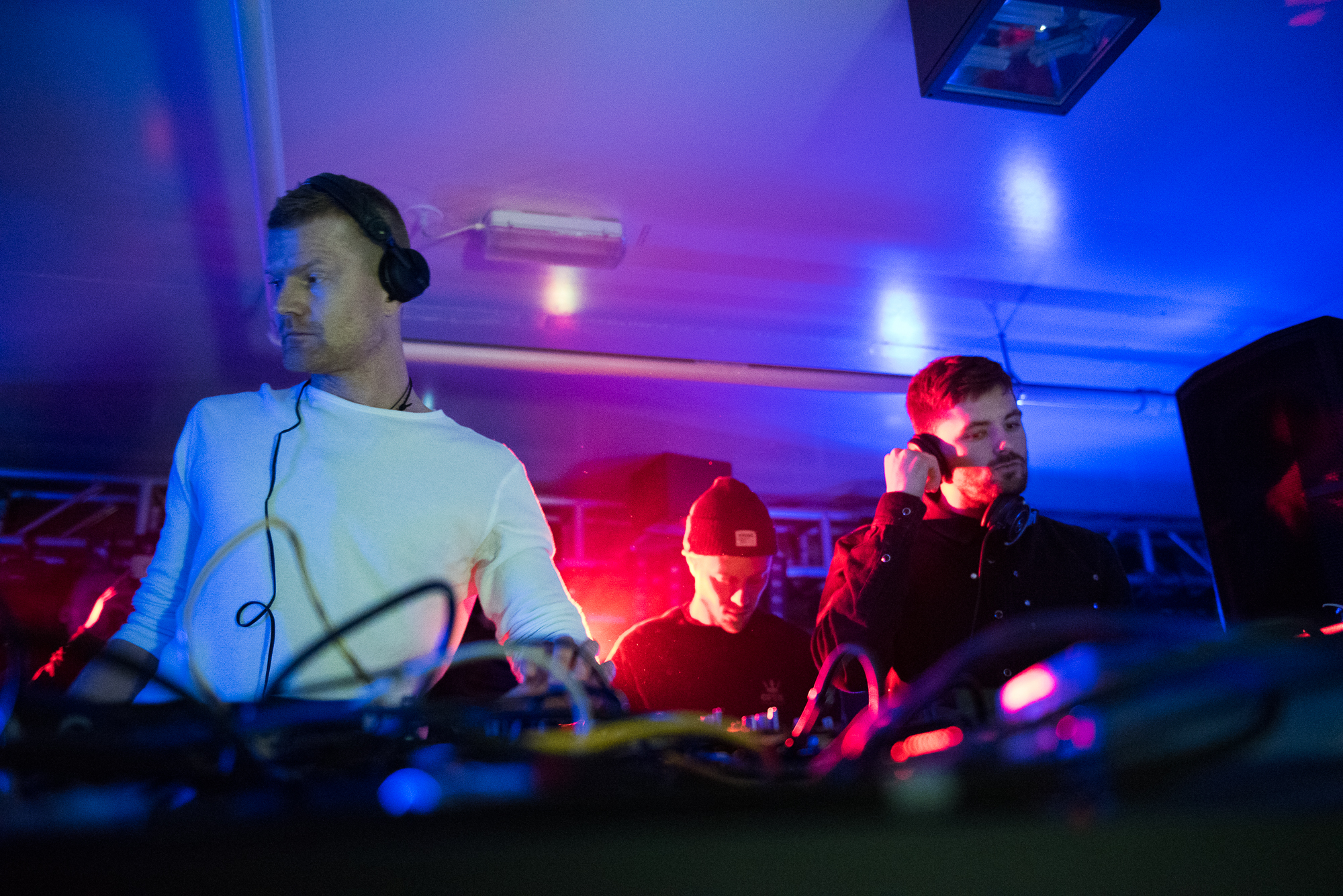 BEA1991 At about 10:25 PM on Saturday, BEA1991 shot the silent, seated crowd at SónarComplex a nervous look. A few people had decided to brave the awkwardness and leave, and it had started a domino effect. Moments later, the previously packed auditorium had emptied by roughly a third. Presumably they'd left because the show had been slow to get going—the Amsterdam-born artist, dressed in an orange jumpsuit, had opened with a series of spoken-word recordings (including this speech from Derek Jarman's 1993 film, Wittgenstein) layered with birdsong and sex sounds. The atmosphere was calm, but I remember wriggling in my seat. BEA1991 sprang to life in the second half, swivelling on her heels and focussing her attention on a sampler, keyboard and mic. She punched out warm, dreamy trip hop beats and played buttery chords over the top. Her voice was beautiful—piercing yet tender—and you could sense the audience warming to her with every note. "I was really nervous before tonight, it's a little like wanting eight arms but not having them," she said, smiling. It turns out this was her first ever solo gig; previously, she'd had a band. This explained the mistakes and the rough-around-the-edges feel, though, for me, this was what was so captivating. Her performance had soul and sparkle. It was just reward for sticking around.
BEA1991 At about 10:25 PM on Saturday, BEA1991 shot the silent, seated crowd at SónarComplex a nervous look. A few people had decided to brave the awkwardness and leave, and it had started a domino effect. Moments later, the previously packed auditorium had emptied by roughly a third. Presumably they'd left because the show had been slow to get going—the Amsterdam-born artist, dressed in an orange jumpsuit, had opened with a series of spoken-word recordings (including this speech from Derek Jarman's 1993 film, Wittgenstein) layered with birdsong and sex sounds. The atmosphere was calm, but I remember wriggling in my seat. BEA1991 sprang to life in the second half, swivelling on her heels and focussing her attention on a sampler, keyboard and mic. She punched out warm, dreamy trip hop beats and played buttery chords over the top. Her voice was beautiful—piercing yet tender—and you could sense the audience warming to her with every note. "I was really nervous before tonight, it's a little like wanting eight arms but not having them," she said, smiling. It turns out this was her first ever solo gig; previously, she'd had a band. This explained the mistakes and the rough-around-the-edges feel, though, for me, this was what was so captivating. Her performance had soul and sparkle. It was just reward for sticking around.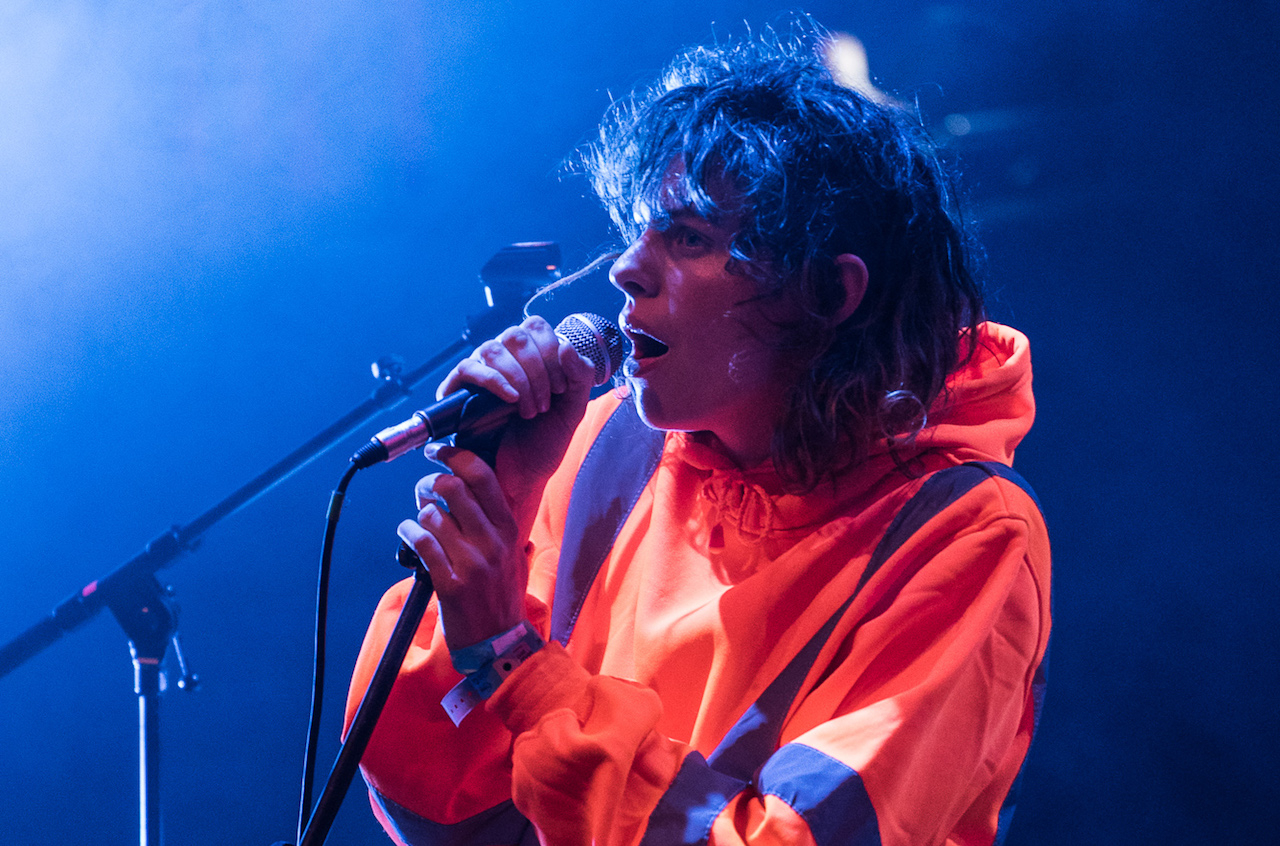 Giggs Giggs headlined the cube-shaped SónarHall on Saturday, playing after 17-year-old Icelandic rapper Aron Can. A sizeable throng had gathered for the teenager, who spat over melodic trap beats while virtual wads of Icelandic Krona rained down onscreen. After a quick drink, I returned to find the room considerably sparser for Giggs—a surprise, but proof that Fatboy Slim, who was playing next door, still lures the crowds. The Peckham artist, real name Nathaniel Thomson, didn't seem fazed, bounding onstage in a blue baseball jacket and shiny gold "giggs" chain. He rattled through tunes from last year's Landlord LP, an album that favours low-slung trap and hip-hop beats to the frenetic grime of his contemporaries. The energy ramped up quickly, spurred on by Thomson's cheeky, personable patter ("We gotta go mental in here. Do something, kick something"). By the time JME's "Man Don't Care" came around, the atmosphere was looser and more jubilant than it had been all weekend. For "Whippin Excursion," the set's finale, a full mosh pit formed two feet in front of me. "Iceland you're sick!" hollered Thompson, as trendy 20-somethings crashed into one another, their beers flailing.
Giggs Giggs headlined the cube-shaped SónarHall on Saturday, playing after 17-year-old Icelandic rapper Aron Can. A sizeable throng had gathered for the teenager, who spat over melodic trap beats while virtual wads of Icelandic Krona rained down onscreen. After a quick drink, I returned to find the room considerably sparser for Giggs—a surprise, but proof that Fatboy Slim, who was playing next door, still lures the crowds. The Peckham artist, real name Nathaniel Thomson, didn't seem fazed, bounding onstage in a blue baseball jacket and shiny gold "giggs" chain. He rattled through tunes from last year's Landlord LP, an album that favours low-slung trap and hip-hop beats to the frenetic grime of his contemporaries. The energy ramped up quickly, spurred on by Thomson's cheeky, personable patter ("We gotta go mental in here. Do something, kick something"). By the time JME's "Man Don't Care" came around, the atmosphere was looser and more jubilant than it had been all weekend. For "Whippin Excursion," the set's finale, a full mosh pit formed two feet in front of me. "Iceland you're sick!" hollered Thompson, as trendy 20-somethings crashed into one another, their beers flailing.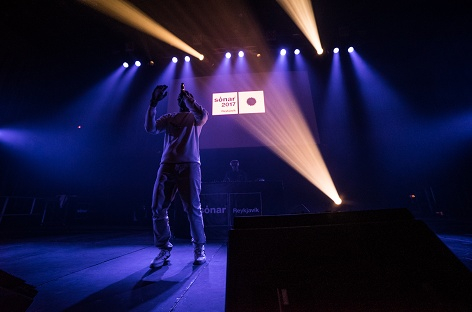 Plútó Plútó are a seven-strong DJ collective with more than 20 years of experience DJing, running parties and hosting radio shows in Iceland. Their grounding is in bass music, from dubstep, breaks and drum & bass to newer styles like footwork, juke and grime. I was always going to check them out—they were down for the final slot of the festival in the car park—but had I never heard of them, my interest would have likely been piqued by the number of old, smiling men I saw in black "Plútó" T-shirts wandering around Harpa. Downstairs, these men, and roughly ten others, were gathered in the booth, drinking beers and cracking jokes. The DJs took turns playing one tune each, pushing past one another with their records held aloft. The music was all over the place in the best possible sense. Ravey techno collapsed into weightless grime and UK bass bangers (Pinch and Riko Dan's "Screamer") morphed into South African gqom (DJ Lag's "Ghost On The Loose"). The mixing was ocassionally sloppy, though the incoming track was usually so fun that no one batted an eyelid. The end of Sónar Reykjavik was fast approaching, and people just wanted to dance. Photo credit / Lilja Draumland - Lead Berglaug Petra - Helena Hauff, Blawan back-to-back Exos, Plútó Ásgeir Helgi - BEA1991, Giggs
Plútó Plútó are a seven-strong DJ collective with more than 20 years of experience DJing, running parties and hosting radio shows in Iceland. Their grounding is in bass music, from dubstep, breaks and drum & bass to newer styles like footwork, juke and grime. I was always going to check them out—they were down for the final slot of the festival in the car park—but had I never heard of them, my interest would have likely been piqued by the number of old, smiling men I saw in black "Plútó" T-shirts wandering around Harpa. Downstairs, these men, and roughly ten others, were gathered in the booth, drinking beers and cracking jokes. The DJs took turns playing one tune each, pushing past one another with their records held aloft. The music was all over the place in the best possible sense. Ravey techno collapsed into weightless grime and UK bass bangers (Pinch and Riko Dan's "Screamer") morphed into South African gqom (DJ Lag's "Ghost On The Loose"). The mixing was ocassionally sloppy, though the incoming track was usually so fun that no one batted an eyelid. The end of Sónar Reykjavik was fast approaching, and people just wanted to dance. Photo credit / Lilja Draumland - Lead Berglaug Petra - Helena Hauff, Blawan back-to-back Exos, Plútó Ásgeir Helgi - BEA1991, Giggs